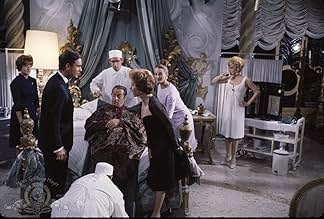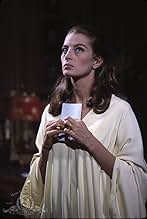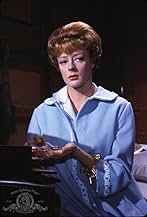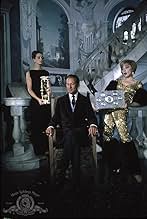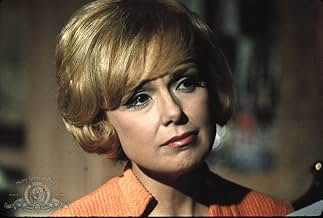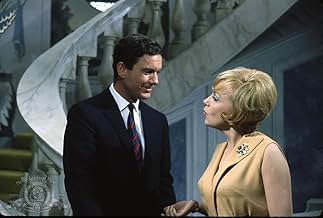AVALIAÇÃO DA IMDb
6,7/10
3,2 mil
SUA AVALIAÇÃO
Adicionar um enredo no seu idiomaIn Venice, a millionaire hires an actor to help him prank three greedy ex-girlfriends into thinking he's dying and leaving his fortune to one of them.In Venice, a millionaire hires an actor to help him prank three greedy ex-girlfriends into thinking he's dying and leaving his fortune to one of them.In Venice, a millionaire hires an actor to help him prank three greedy ex-girlfriends into thinking he's dying and leaving his fortune to one of them.
- Direção
- Roteiristas
- Artistas
Herschel Bernardi
- Oscar Ludwig
- (cenas deletadas)
Massimo Serato
- The Pretender
- (cenas deletadas)
Jack Benny
- Violinist outside restaurant
- (não creditado)
Mimmo Poli
- Cook
- (não creditado)
Luigi Scavran
- Massimo
- (não creditado)
Avaliações em destaque
Taking an inspiration from his favorite Jacobean play, Ben Jonson's Volpone, fabulously wealthy Rex Harrison hires an out of work actor Cliff Robertson to play an elaborate practical joke on three women who've been part of his life. Robertson's to play his confidential secretary and assistant and to send them letters inviting them to Venice where Harrison is pretending to be dying in his palazzo.
To be sure these are three women to die for indeed. There is Princess Capucine with a title, but little else going for here as she becomes one of those permanent house guests on the Riviera. Then there's movie star Edie Adams originally from the Greenpoint section of Brooklyn whose best days as a film star are behind here and not enough money is coming in to keep up with her lifestyle spending. Finally there is the mysterious and earthy Susan Hayward. Imagine if you will Susan as Rachel Jackson, but with a malevolent twist and you've got her character. She's also a hypochondriac and travels with nurse/companion Maggie Smith.
The joke's proceeding great until Hayward winds up dead and the police in the person of Inspector Adolfo Celi is brought in. Joseph Mankiewica's literate script glides ever so gently from comedy of manners to murder mystery. And not like everyone of them hasn't got reason to do in Hayward. Just see the film and you'll know what I mean.
Sad that The Honey Pot failed to find an audience. Also sad that it was two years from the Stonewall Rebellion, Harrison's bisexuality was not more explicit. In regard to that read Hayward's comments on their lives together and the dialog exchanges between Harrison and Robertson.
In fact The Honey Pot does turn out to be an elaborate joke, but you have to see who winds up winners and losers in this very intelligent and witty film.
To be sure these are three women to die for indeed. There is Princess Capucine with a title, but little else going for here as she becomes one of those permanent house guests on the Riviera. Then there's movie star Edie Adams originally from the Greenpoint section of Brooklyn whose best days as a film star are behind here and not enough money is coming in to keep up with her lifestyle spending. Finally there is the mysterious and earthy Susan Hayward. Imagine if you will Susan as Rachel Jackson, but with a malevolent twist and you've got her character. She's also a hypochondriac and travels with nurse/companion Maggie Smith.
The joke's proceeding great until Hayward winds up dead and the police in the person of Inspector Adolfo Celi is brought in. Joseph Mankiewica's literate script glides ever so gently from comedy of manners to murder mystery. And not like everyone of them hasn't got reason to do in Hayward. Just see the film and you'll know what I mean.
Sad that The Honey Pot failed to find an audience. Also sad that it was two years from the Stonewall Rebellion, Harrison's bisexuality was not more explicit. In regard to that read Hayward's comments on their lives together and the dialog exchanges between Harrison and Robertson.
In fact The Honey Pot does turn out to be an elaborate joke, but you have to see who winds up winners and losers in this very intelligent and witty film.
This is a very good film adaptation of a story that has had a number of permutations. The original source of the story dates to British poet and playwright Ben Jonson's (1572-1637) satirical play, "Volpone." Thomas Sterling's "Evil of the Day" was a 1955 novel, and playwright Frederick Knott then adapted that source into the play, "Mr. Fox of Venice."
The theme of the original work is carried through all the renditions of the story. It's a biting satire on greed, with a complex staged practical joke as the main plot. The comedy isn't of the rollicking laughter type, but in the exaggerations with the drama and the characters themselves. Most of the characters of the Ben Jonson play are carried through all renditions, except that in the 20th century story the three characters of avarice are women instead of men.
Director Joseph Mankiewicz does a masterly job of adapting and then directing the story, with an introduction and closing comments in voice over by the main character, Cecil Fox. He uses this technique very subtly for one other character toward the end. Another reviewer delighted in what he called the "Maltese Falcon" ending. It is fantastic in itself.
The film was made mostly in Rome, with some canal scenes shot in Venice. The producers assembled a first-rate cast to play the diverse roles. All give performances worthy of academy award nominations. Rex Harrison is superb as Cecil Fox, and Susan Hayward dominates her scenes as Mrs. Sheridan - Fox's "Lone Star" mistress from the past. Cliff Robertson adds enough mystery to his dutiful and slyly charming role as William McFly. A nearly 40 Capucine still radiates the sophisticated beauty for which she was known, here playing Princess Dominique. And Maggie Smith shows for the first time on film her deftness for deadpan humor. Her nurse Sarah Watkins is both demure, suspicious and slightly sly.
Adolfo Celi is very good as Inspector Rizzi, who plays some scenarios superbly for comedy. The scenes in his home are hilarious where his family members are glued to the TV watching a Perry Mason mystery show. The Italian voice-over for Raymond Burr's Mason is hilarious - a high-pitched male voice coming out of the tube when Perry speaks.
But the star who provides most of the laughter in "The Honey Pot" is Edie Adams. She plays Merle McGill, an otherwise attractive movie star who, underneath, is little more than a ditzy blonde and opportunist. She was someone Fox picked up off the street years before and turned into a movie icon.
Here are some favorite lines form this film.
Inspector Rizzi, "Miss McGill, I understand the necessity of you to arrive in Venice incognito." Merle McGill, "I wouldn't go anywhere (sic) uninvited." Inspector Rizzi, "I must have used the wrong word. My English is uh...." Merle McGill, "It must be hard for you to imagine, inspector - a man like Cecil Fox and I." Inspector Rizzi, "Not hard at all." McGill, "How can I say it, inspector? He was my first... man. Somehow, you just never forget your first man." Rizzi, "I remember mine, vividly. He also got away."
Merle McGill, "OK, shamus, so what's on your mind? Or, to be exact, on both your minds?" Inspector Rizzi, "Shamus? You use too many American idioms I do not know."
Merle McGill, "When you do talk to Princess Dominique, you know what she's gonna tell ya?" Inspector Rizzi, "If I had such capability, I would never get out of bed." McGill, "She's gonna say that she and I were here, in my room, all night, playing gin rummy together. That'll be a lie. For one thing, she can't even play gin rummy." Rizzi, "Fascinating! Now why would she choose a game she could not play?" McGill, with a "caught" look on her face, "Yeah, that was stupid of her, but the name of the game isn't important."
Princess Dominique, "I have no need for Mr. Fox's money." Inspector Rizzi, "That is what truly baffles me. This incredible wealth which nobody needs and everybody wants."
The theme of the original work is carried through all the renditions of the story. It's a biting satire on greed, with a complex staged practical joke as the main plot. The comedy isn't of the rollicking laughter type, but in the exaggerations with the drama and the characters themselves. Most of the characters of the Ben Jonson play are carried through all renditions, except that in the 20th century story the three characters of avarice are women instead of men.
Director Joseph Mankiewicz does a masterly job of adapting and then directing the story, with an introduction and closing comments in voice over by the main character, Cecil Fox. He uses this technique very subtly for one other character toward the end. Another reviewer delighted in what he called the "Maltese Falcon" ending. It is fantastic in itself.
The film was made mostly in Rome, with some canal scenes shot in Venice. The producers assembled a first-rate cast to play the diverse roles. All give performances worthy of academy award nominations. Rex Harrison is superb as Cecil Fox, and Susan Hayward dominates her scenes as Mrs. Sheridan - Fox's "Lone Star" mistress from the past. Cliff Robertson adds enough mystery to his dutiful and slyly charming role as William McFly. A nearly 40 Capucine still radiates the sophisticated beauty for which she was known, here playing Princess Dominique. And Maggie Smith shows for the first time on film her deftness for deadpan humor. Her nurse Sarah Watkins is both demure, suspicious and slightly sly.
Adolfo Celi is very good as Inspector Rizzi, who plays some scenarios superbly for comedy. The scenes in his home are hilarious where his family members are glued to the TV watching a Perry Mason mystery show. The Italian voice-over for Raymond Burr's Mason is hilarious - a high-pitched male voice coming out of the tube when Perry speaks.
But the star who provides most of the laughter in "The Honey Pot" is Edie Adams. She plays Merle McGill, an otherwise attractive movie star who, underneath, is little more than a ditzy blonde and opportunist. She was someone Fox picked up off the street years before and turned into a movie icon.
Here are some favorite lines form this film.
Inspector Rizzi, "Miss McGill, I understand the necessity of you to arrive in Venice incognito." Merle McGill, "I wouldn't go anywhere (sic) uninvited." Inspector Rizzi, "I must have used the wrong word. My English is uh...." Merle McGill, "It must be hard for you to imagine, inspector - a man like Cecil Fox and I." Inspector Rizzi, "Not hard at all." McGill, "How can I say it, inspector? He was my first... man. Somehow, you just never forget your first man." Rizzi, "I remember mine, vividly. He also got away."
Merle McGill, "OK, shamus, so what's on your mind? Or, to be exact, on both your minds?" Inspector Rizzi, "Shamus? You use too many American idioms I do not know."
Merle McGill, "When you do talk to Princess Dominique, you know what she's gonna tell ya?" Inspector Rizzi, "If I had such capability, I would never get out of bed." McGill, "She's gonna say that she and I were here, in my room, all night, playing gin rummy together. That'll be a lie. For one thing, she can't even play gin rummy." Rizzi, "Fascinating! Now why would she choose a game she could not play?" McGill, with a "caught" look on her face, "Yeah, that was stupid of her, but the name of the game isn't important."
Princess Dominique, "I have no need for Mr. Fox's money." Inspector Rizzi, "That is what truly baffles me. This incredible wealth which nobody needs and everybody wants."
The Honey Pot is a delightful comedy mystery that seems destined to be under-appreciated. On the surface, an updating of Ben Jonson's Volpone, the plot twists in unexpected directions, confounding the viewer until the very end. While the mystery itself takes some time to get started, I found the film thoroughly entertaining due in great part to the witty dialogue of masterful Jospeh L. Mankiewicz and the colorful characterizations delivered by a wonderful cast led by Rex Harrison, Cliff Robertson and Maggie Smith. The dialogue also reaches some interesting depths towards the end of the film when Harrison's character makes some thoughtful reflections about time. As others have pointed out, the plot involves a lot of talking and takes its time to unfold, but this is part of the charm of the story. It is perhaps less about the mystery itself than the amusing interactions among a set of opportunistic and sly characters plotting against each-other. Performances are all around superb. Rex Harrison is exquisite as the cunning and charming orchestrator of the intrigue. Cliff Robertston is flawless as the quick-witted McFly/Mosca, executing his master's plan with intelligence and humorous servility. Just as delightful are Maggie Smith as the not-so-innocent nurse bringing a moral conscience to the story, Susan Hayward as a brash and aging American millionairess and Edie Adams as a rather crude Monroesque movie star. Perhaps a little too slow and not exciting enough for most audiences, The Honey Pot is neverthess worth the time of those interested in sophisticated and humourous dialogue, unusually creative mystery, and engaging performances.
In Venice, the millionaire benefactor Cecil Fox (Rex Harrison) watches the Seventeenth Century play Volpone and plots a practical joke to his three former greedy mistresses. He hires the unemployed actor William McFly (Cliff Robertson) to act as his butler and stage manager and sends letters telling that he is terminal to the decadent Hollywood star Merle McGill (Edie Adams); to the broken Princess Dominique (Capucine); and to the sick Lone Star Crockett (Susan Hayward), who was married with him and arrives in his palace bringing the nurse Sarah Watkins (Maggie Smith) as her companion. The prime intention of Rex is to see the reaction of the women after the reading of his will declaring McFly as the only heir of his fortune and then laugh up them. However, when Mrs. Sheridan is found dead in her room, the snoop Sarah decides to investigate and realizes that the prank is indeed an intricate scheme to get the fortune of Rex.
"The Money Pot" is a delightfully witty film of the great director Joseph L. Mankiewicz. The sophisticated and theatrical screenplay has wonderful lines and many plot points that surprises many times and a mystery that recalls the novels of Agatha Christie. The direction and the performances are superb, highlighting Rex Harrison, Cliff Robertson, Maggie Smith and Adolfo Celi, the Venetian inspector that watches Perry Mason at home. My vote is nine.
Title (Brazil): "Charada em Veneza" ("Charade in Venice")
"The Money Pot" is a delightfully witty film of the great director Joseph L. Mankiewicz. The sophisticated and theatrical screenplay has wonderful lines and many plot points that surprises many times and a mystery that recalls the novels of Agatha Christie. The direction and the performances are superb, highlighting Rex Harrison, Cliff Robertson, Maggie Smith and Adolfo Celi, the Venetian inspector that watches Perry Mason at home. My vote is nine.
Title (Brazil): "Charada em Veneza" ("Charade in Venice")
The "Fox" (rex harrison, a couple years after My Fair Lady) invites his ex girlfriends to visit. and this will require the assistance of an assistant, who can be relied upon, and is willing to tell some lies in the process. he hires McFly (Cliff Robertson) to help him play a huge trick on the ladies: her highness (capucine), Bunny McGill (edie adams), and the feisty Mrs. Sheridan (susan hayward). They are all lured there with the idea that someone is dying, and will leave a huge fortune to one of them. Mrs. Sheridan has a nurse, or assistant, or something... played by the awesome Maggie Smith. so the ladies all spend the next couple days arguing over who has the most right to the fortune. lots of talking. and some shenanigans. mayhem. some twists and turns. a couple gay references. directed by joe mankeiwicz. story by Thomas Sterling. his only novel. which itself, was based on the 1606 play Volpone (Fox!) by Benjamin Jonson, according to wikipedia dot com. it's quite good. the actors mostly yell and snarl at each other. Maggie Smith was great as usual, and the story is fun to watch as it unfolds.
Você sabia?
- CuriosidadesThe great Italian cinematographer Gianni Di Venanzo died suddenly of hepatitis (aged only 45) during the making of this movie, with many weeks of the five-month shooting schedule to go before completion. His operator, Pasqualino De Santis, took over as director of photography, but refused credit in this capacity, although he would quickly go on to international renown with his work for Luchino Visconti, Franco Zeffirelli, Joseph Losey, and others.
- Erros de gravaçãoNear the beginning, when Dominique is bent over drawing her bath, a shadow of the camera falls across her back.
- Citações
William McFly: An actor's gratitude is, at best, a mirage.
- Cenas durante ou pós-créditos"Based Upon: A Play by Frederick Knott and A Novel by Thomas Sterling - and A Play by Ben Jonson"
- ConexõesFeatured in Discovering Film: Rex Harrison (2015)
Principais escolhas
Faça login para avaliar e ver a lista de recomendações personalizadas
- How long is The Honey Pot?Fornecido pela Alexa
Detalhes
- Data de lançamento
- País de origem
- Idiomas
- Também conhecido como
- El jarro de miel
- Locações de filme
- Empresa de produção
- Consulte mais créditos da empresa na IMDbPro
Bilheteria
- Orçamento
- US$ 6.000.000 (estimativa)
- Faturamento bruto mundial
- US$ 11.159
- Tempo de duração2 horas 30 minutos
- Cor
- Proporção
- 1.85 : 1
Contribua para esta página
Sugerir uma alteração ou adicionar conteúdo ausente

Principal brecha
By what name was Charada em Veneza (1967) officially released in India in English?
Responda


